We talked with Steve Dorrance, son of Bill Dorrance, and Steve’s wife of over three decades, Leslie Dorrance, at the Great Basin Buckaroo Gathering in Ogden, Utah. At this event, two of horsemanship’s next generation, Joe Wolter and Martin Black, who both credit the Dorrances for their tutelage, held a sold-out clinic.
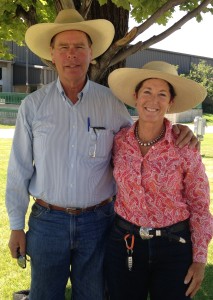 At the family ranch in Salinas, California, Steve, 59, and his two brothers were horseback and roping cattle “as soon as we were old enough,” he said. Now, the couple’s three children are all handy, but daughter Mollie Dorrance is most keen on riding and roping, her parents said.
At the family ranch in Salinas, California, Steve, 59, and his two brothers were horseback and roping cattle “as soon as we were old enough,” he said. Now, the couple’s three children are all handy, but daughter Mollie Dorrance is most keen on riding and roping, her parents said.
The couple took time to reflect on the quiet, gentle approach that Bill and his brother, Tom Dorrance had towards horses and people. They also made note of the brothers’ life-long interest in learning.
Read more about the Dorrance legacy.
Read Part II of this interview.
What follows are excerpts from our conversation.
Steve Dorrance: When the clinics got going, my dad would go to just about anybody’s clinic. He always came away with something. And he didn’t have any opinion on who he should and shouldn’t see. Tom felt that way, too.
Tom would say he was always fearful of the day people found out that he didn’t know anything. He’d say that and laugh. But he was still learning. There were things he was still experiencing and learning.
I do remember that time when Tom was starting to work with Ray Hunt in the 1960’s. Ray was pretty rough. He was really athletic… But Ray has a real strong desire to have it just a little bit different. Even though he was that athletic, he had some horses that he wasn’t quite getting done what he wanted to get done.
Ray had asked my dad for help and my dad wasn’t able to get across to Ray what he would do with the horse. He said it’d probably be good to have Tom look at it. So, that
became a regular deal. How Tom presented it, Ray was able to pick up on it.
It didn’t bother my dad a bit. He was kind of learning from what Tom and Ray were doing, progressing.
Tom was pretty adamant that Ray was about the one who could get close to what Tom felt like. Everybody else sees it from a little bit different perspective. There isn’t going to be another Tom, Ray, or Bill. But there is Joe, Martin, Randy, Bryan. You can just go down the line. They are out there. I think the horses are better off for it. People are gaining.
BestHorsePractices: How do you know people are doing better now, compared to a generation ago?
SD: Out here, watching the cattle, in this hot weather and with black cattle, to boot… Most people back then would be in them, on them, running them around. The horses would be lathered up.
I haven’t really seen any horses lathered up here. There is more stockmanship.
Leslie Dorrance: There is more attention to taking care of your horse and the livestock. That’s the goal in the end, anyway. They had just forgotten that. For a long time, there was an image of big rodeo and ‘yahoo.’ But I think they are getting back to those roots of taking care of their livestock. It makes a big difference.
SD: I’m confident that if my dad were here today, he’d have really enjoyed it. He’d have been adding.
LD: He’d have called Joe over to say something. They knew that about him.
SD: He’d be visiting with people in the stands to help them understand what was going on.
LD: He would see something that he might be able to help out on and Joe and Martin would both listen because they would understand what he was talking about .
SD: I think he would have been pleased that people are still learning and horses are getting handier, better.
I don’t know that he had any prejudices in regards to who he helped. He was as likely to help the most inexperienced person as
somebody that was further up the line.
He liked working with women…they weren’t as strong or aggressive. They were way easier on the horses. Whereas a lot of the guys were like he had been; there was a lot of pulling going on. So, when they did the roping clinics, he was really tickled that it was more balanced, male and female.
LD: He had some really simple steps that made it really easy to learn and it’s so safe, too. And learning about leverage and those calves, so that you don’t end up over the top of them. It’s a lot more relaxed. You don’t have to be struggling and tense while holding onto a calf. A lot of times, if you’re tense, the calf stays tense, too. But if you relax, they calm down. And there is such a window you have, you can almost let go of that foot, do a loop and put it on the front feet without them struggling at all. But people – and women especially because they feel weaker against this big animal – they tend to get too tight. It was really helpful what Bill taught us about that.
SD: At a branding, usually the husband would yell at the wife what to do. And, in a relationship, that’s usually a bad thing. A bad thing. So, the wife would quit or get frustrated. My dad would enjoy working with the wife.
He’d learn quite a bit on how to approach it (from a women’s perspective). He already knew because he was older. He was losing muscle mass by then. The physical part he couldn’t do. He wanted to get it so that everyone could do it.
BHP: He was resourceful.
SD: He was using us kids as soon as we were old enough to be horseback. I was five or six. He’d rope the calves, head them, then go around and hand one of us the rope to dally. Then he’d go and heel it and hand that rope to another fella and then another one was on the ground.
BHP: Tell me more about Bill and Tom in the early days of clinics (1970-80’s)
SD: Joe has said that my dad and Tom were doing the same thing but approaching it from a different direction. He said it in a
complimentary way. It’s like this deal today with Martin and Joe. You get a couple things to go home with. I told Leslie, ‘Wouldn’t it be wonderful to go home right now and get horseback to work on some things?’
My dad would go to a show or come back from somebody’s clinic. Ray’s clinic. He went to some of Buck Brannaman’s clinics. Whoever. What he’d do when he came back: he’d just get horseback. He’d be thinking about something or he’d seen something new.
When Tom had some health issues, I visited almost every day. Tom enjoyed it. I enjoyed it. He called it re-riding horses long gone and dead. We’d go back to those horses that I rode when he was around, talking about how they were and what we would have tried differently, approached things differently. We were still learning on horses long gone and dead.
LD: He lost his eyesight toward the end. It was all kind of blurry for him. But he would ask me what was happening and he’d kind of tell me what might help. It was really interesting. He pictured it. He thought about how it was for the horse. He had such a curiosity about what makes the animals do what they do. He had a lot of curiosity about that. He had the experience and knowledge in how the horse might react, based in how the horse was, the temperament of the horse.
Bill spent a lot of time with the people. Tom spent a lot of time getting people to understand how they could help the horse and Bill worked on the people part a lot. He was pretty comfortable conversing with the people, what they could do. It was a different way to approach the same thing. You see it in the clinicians – they approach it differently. Some understand the animal side a lot better, some how to interpret to people better.
SD: As far as getting credit or recognition, he wasn’t in it for that. He could stand a little bit of it. But really, he was in it because it was interesting to him… He would be really tickled with what they’re doing today, how their horses are, how it’s working now for them.
BHP: You mentioned your dad was drafted in the Army in 1940 and served during World War II. He ended up as a cook?
SD: They were in the South Pacific. They had them marching. It was hot. He had flat feet. My dad wouldn’t walk. Tom wouldn’t walk. They were completely against walking. Anyway, they came through and asked if anyone could cook. He stepped forward and was asked what his qualifications were. He said he’d ‘batched.’ (cooked as a bachelor). The sergeant said that’ll do. So, he was an Army cook. It was really hard being locked up in the Army for those years. But he smuggled some rawhide and some of the nicest work he did while in the Army.
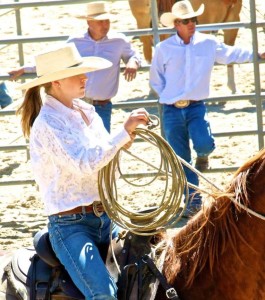
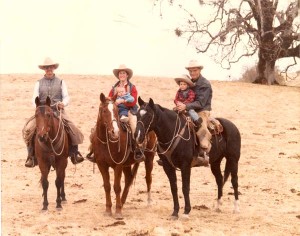
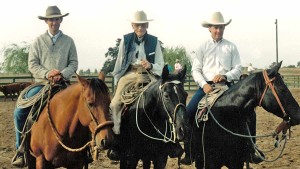
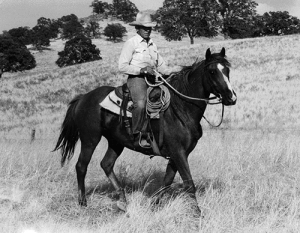
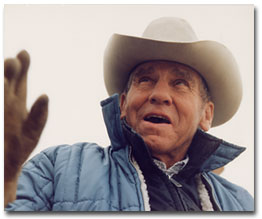
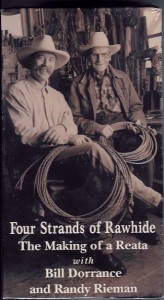
Very sad news sounds a great woman and fine horse woman too. May she rest peacefully.